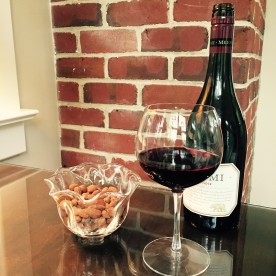Robbie and I just got back from Italy. It was a bucket-list trip, one made all the sweeter since we went with a group of friends from our church. Billed as the “Saints and Sinners Tour,” I think the idea was to take a bunch of (mostly) old American sinners and introduce us to a bunch of (really) old Italian saints, and hope something good would rub off.

We marveled over the humility of Francis of Assisi, a pampered party boy who renounced his luxurious lifestyle in order to “wed” Lady Poverty. That move didn’t sit too well with his father–especially when Francis stripped naked in the public square to demonstrate his commitment, leaving the Bishop to try to, um, cover things up:

We applauded the courage of Catherine of Siena, a spunky saint best remembered for telling Pope Gregory XI (and I’m paraphrasing here) to “Man up!” and get back to his duties in Rome. (The Pope had been living in Avignon; having been to both cities, I can see why he might not have wanted to move.)

And we heard about folks like St. Philip Neri, a Florentine monk who thought Christians ought to be more cheerful than melancholy, and that being holy didn’t mean you had to look serious or sad. Known to carry two things in his pockets–a Bible and a joke book–Neri is one of those saints I hope I get to sit by at the welcome dinner in heaven.
I liked the saint stories, or at least most of them. Truth be told, though, they were not my favorite part of the trip. Maybe I’m just a bigger sinner than most, but what I really loved about Italy were the vineyards. Which, remarkably, seemed to be flourishing.

I’m no farmer, but I did take one class in meteorology at U.Va., and I could tell it was hot. Over 100 degrees, according to the weather apps on our phones. Plus, Italy was in the midst of a drought. “Pray for rain,” our tour guide pleaded, when she realized our group was on speaking terms with the Lord. “We really need it.”

We could see what she meant. I woke early one morning to greet the Tuscan sunrise, but I had to look down every few steps. Walking was tricky; the ground was so parched that the soil was cracked.

How, I wondered, could anything survive in that heat? How could the vines keep bearing fruit? I would think they’d be spitting out raisins; how come the grapes looked so healthy and lush?
As I pondered these questions, I sensed the Holy Spirit’s whisper. “The branches survive as they stay attached to the vine,” he said. “They don’t have to try to produce grapes; that happens naturally, as they do their one job: Abiding.”

Ahhh. A fresh twist on Christ’s words in John 15:5. “I am the vine; you are the branches. If you remain in me and I in you, you will bear much fruit; apart from me you can do nothing.”
Created for connection
Like grapevines, you and I are created for connection. The degree to which we stay connected to Christ is the degree to which we will thrive. But what does that vine-branch connection look like in our everyday lives? How do we, practically speaking, abide?

Back in 1900, R.A. Torrey tackled this question in a book that’s now widely considered a classic: How to Pray. “To abide in Christ,” he wrote, “is to renounce all life independent of Christ, and constantly look to Him for the inflow of His life into us, and the outworking of His life through us. When we do this, and in so far as we do this, our prayers will obtain that which we seek from God.”
Put another way, when we take Jesus up on his John 15 invitation–when we say yes to dwelling in Christ and letting him dwell in us–our prayer life changes. No longer do we cultivate our own feelings and desires; rather, it is Christ who forms his thoughts, emotions, and purposes in us. And the more we allow this life-giving flow of his life into ours, the more powerful and effective our prayers become.
The more we become people of impact.
The more we live lives marked by purpose and meaning.
The more we bear lush, healthy, life-giving fruit.


(And yes. I was captivated by the ginormous lemons in Italy. They were like footballs.)
(Well okay. Footballs for children. But still.)
A harvest on the horizon
If you’re following along with our 31-Day Prayer Challenge this month (and if you are, you’re not alone; more than 20,000 people have downloaded the calendar and are praying with us!), you might already be seeing a harvest–or at least a glimpse of it on the horizon, as you allow God’s promises to give shape to your prayers. This week, for example, we invited God to animate our relationships, praying Philippians 2:3-4 (“Let me value others and put their interests above my own”) and asking him to fulfill 1 John 3:18 in our lives (“Give me friends who will love not just with words but with actions”).


And there are plenty more topics on tap. We’ll ask God to help us to navigate suffering and grief, give us freedom from worry and fear, and teach us use our gifts and talents wisely. We’ll even pray about what it looks like to approach aging well!

I’ve said it before, but it bears repeating: There is nothing we’ll face in life that God has not already thought of (and provided for!) in his Word. If you want to join us on the prayer challenge, click here for more info. If you just want to download the calendar so you can follow along on your own, click here. And if you want to dig deeper on the whole subject of staying connected to Christ, click here to get your copy of Praying the Scriptures for Your Life: 31 Days of Abiding in the Presence, Provision, and Power of God. (There’s an entire chapter on what it means to abide, filled with insights from biblical brainiacs who know how to put the hay where the sheep can reach it.)
I’ll leave you with one more reflection from Italy, which comes (appropriately) in the form of a confession.
Yes, I liked the saints. And yes, I liked the vineyards. But what I mostly liked (and what I maybe got in trouble for stealing) was the secret stash of ice I found in the hotel refrigerator.
The cubes were almost as big as the lemons.
And boy-oh-boy, was I grateful.

Blessed is the one who trusts in the Lord,
whose confidence is in him.
They will be like a tree planted by the water
that sends out its roots by the stream.
It does not fear when heat comes;
its leaves are always green.
It has no worries in a year of drought
and never fails to bear fruit.
















